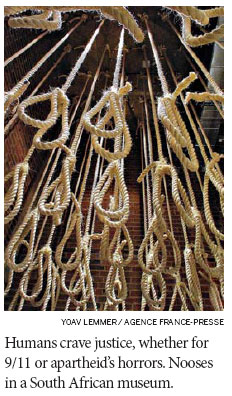View
Appetite for vengeance
Updated: 2011-05-22 08:28
(New York Times)
 |
A line between revenge against innocents and justice for murderers.
Simon Wiesenthal, who survived Hitler's death camps to become the most dogged of Nazi hunters, stressed that he was seeking "justice, not vengeance."
Either way, the feeling was sweet.
A biographer, Tom Segev, wrote that the sight of former SS officers in shackles filled Wiesenthal "with an elation akin to that evoked by divine worship."
The revelers who celebrated the news earlier this month of Osama bin Laden's death could relate. And few probably cared when the French publication L'Express countered that "to cry one's joy in the streets of our cities is to ape the turbaned barbarians who danced the night of September 11."
But what is the appropriate response when evil meets justice? There may never be a definitive answer. In the meantime, there is no shortage of opinions.
As Maureen Dowd wrote in The Times, "those who celebrated on September 11 were applauding the slaughter of American innocents." She called those who found joy in Bin Laden's death "the opposite of bloodthirsty: they were happy that one of the most certifiably evil figures of our time was no more."
They were also being human. The Times's Benedict Carey cited research suggesting that such celebrations express a primordial, collective instinct.
Michael McCullough, a psychologist at the University of Miami, told Mr. Carey: "Revenge evolved as a deterrent, to impose a cost on people who threaten a community ...In that sense it is a very natural response."
Still, some people aspire to be more like the Dalai Lama, who has urged compassion for Bin Laden, and to rise above our natural appetite for retribution.
"The antidote for revenge is not revenge," said Izzeldin Abuelaish, a Palestinian gynecologist who lost three children in an Israeli attack. Dr. Abuelaish, the author of "I Shall Not Hate: A Gaza Doctor's Journey on the Road to Peace and Human Dignity," told The Times, "If I want to get revenge it will not return my daughters."

Elie Wiesel, the Holocaust survivor and Nobel Peace Prize winner, told The Times that Dr. Abuelaish understood that "hate hates both the victim and the hater. One must not forget, but not use memory against other innocent people."
Of course, there is a distinction between indiscriminate revenge against innocents and justice for murderers. Mr. Wiesenthal imagined that if he met victims of the Nazis in heaven, he would say to them, "I didn't forget you.''
Wiesenthal died in 2005 after helping to apprehend hundreds of war criminals. He did not live to see the latest and possibly last conviction of a Nazi. In 1993, an Israeli court found that John Demjanjuk was not the particularly cruel guard at Treblinka known as Ivan the Terrible, and he was freed.
But on May 13, a German court ruled that Mr. Demjanjuk was guilty for his role as a guard at another death camp, Sobibor, and sentenced him, at age 91, to five years in prison.
"He is a very small fish," Rudie S. Cortissos, whose mother died at Sobibor, told The Times. "But whether you are a whale or a sardine, someone who went wrong this way should be punished."
Kevin Delaney
Specials

Suzhou: Heaven on Earth
Time-tested adages sing praises of Suzhou, and Michael Paul Franklin finds it's not hard to understand why on a recent visit.

The sky's the limit
Chinese airline companies are increasingly recruiting pilots and flight attendants as the industry experiences rapid expansion.

Diving into history
China's richest cultural heritage may lie in the deep, like exhibits in a giant underwater museum.